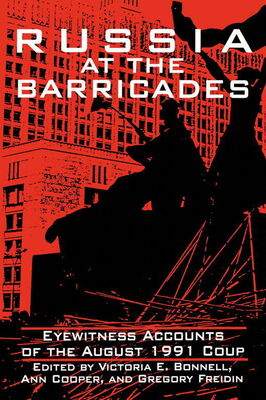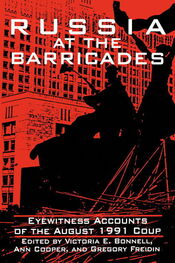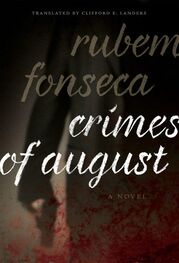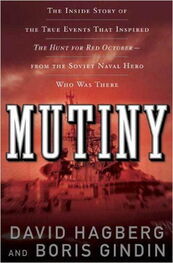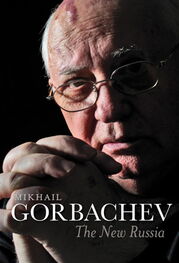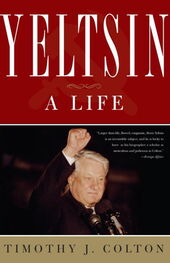Library of Congress Cataloging-in-Publication Data
Russia at the barricades : eyewitness accounts of the August 1991 coup / edited by Victoria E. Bonnell, Ann Cooper, and Gregory Freidin.
p. cm.
Includes index.
ISBN 1–56324–271–0 (cloth)
ISBN 1-56324-272-9 (pbk.)
1. Soviet Union—History—Attempted coup. 1991—Personal narratives. 2. Soviet Union—History—Attempted coup. 1991—Sources.
I. Bonnell, Victoria, E.
II. Cooper, Ann.
III. Freidin, Gregory.
DK292.R86 1991
947.085’4’0922—dc20 93–27944
CIP
ISBN 13: 9781563242724 (pbk)
ISBN 13: 9781563242717 (hbk)
Quoted in Michael R. Beschloss’s review of The Turn from the Cold War to a New Era: The United States and the Soviet Union, 1983–1990 by Don Oberdor-fer, in The New York Times Book Review , October 27, 1991, p. 11.
For analyses of Gorbachev’s reforms, see the essays in Alexander Dallin and Gail Lapidus, eds., The Soviet System in Crisis: A Reader of Western and Soviet Views (Boulder, San Francisco, Oxford, 1991); and George Breslauer, ed., Will Gorbachev’s Reforms Succeed ? (Berkeley, 1990).
Valentin Stepankov and Yevgenii Lisov report that it was Gorbachev who insisted on August 20 as the signing date for the Treaty; other cosigners had wanted to wait until the end of the vacation season. See Stepankov and Lisov, Kremlevskii zagovor: versiia sledstviia (Moscow, 1992), p. 83.
A close observer of the Soviet scene noted that in June and July 1991, “the army–KGB–MVD troika undertook a well-orchestrated effort to weaken Gorbachev domestically and to humiliate him internationally…. [It] seems evident that the coup leaders were laying groundwork for a move against Gorbachev [and] the anti-Gorbachev alliance was gaining experience in working together.” See Scott R. McMichael, “Moscow Prelude: Warning Signs Ignored,” RFE/RL Research Institute, Report on the USSR , vol. 3, no. 36 (1991), pp. 10–11. The account that follows draws upon McMichael’s article.
Yakovlev’s last warning came in an “open letter,” dated August 16, 1991, that was published in Nezavisimaia gazeta on August 18. Among other things, Yakovlev wrote that “shadow structures” had already been established and were “waiting for the right moment to carry out a takeover.”
Foreign Minister Aleksandr Bessmertnykh and the U.S. Ambassador in Moscow, Jack Matlock, served as intermediaries (David Remnick, Lenin’s Tomb: The Last Days of the Soviet Empire [New York, 1993], pp. 436–37). According to Bessmertnykh’s testimony, when he conveyed Baker’s warning to Gorbachev (after Ambassador Matlock had done the same), Gorbachev responded that he had already had a “talk with these statesmen , a tough talk” (Stepankov and Lisov, Kremlevskii zagovor , p. 79).
The interview, published under the title “Nachinaetsia revoliutsiia snizu,” appeared in Literaturnaia gazeta , August 28, 1991. The text may be found in English translation in Russian Politics and Law: A Journal of Translations , vol. 31, no. 1 (Summer 1992), pp. 21–26.
The official text of the Treaty was made public on August 15. Under the provisions of the Treaty the office of USSR Vice President was to be abolished, a fact that throws some light on Gennadii Yanaev’s participation in the plot.
Gorbachev chose Vladimir Shcherbakov, Pavlov’s deputy, to accompany him to the G7 meeting of leaders of the top industrial nations.
A comprehensive discussion of these factors can be found in Dawn Mann, “The Circumstances Surrounding the Conservative Putsch,” in RFE/RL Research Institute, Report on the USSR , vol. 3, no. 36 (1991), pp. 1–5.
Stepankov and Lisov, Kremlevskii zagovor , p. 85.
The Committee’s name was officially abbreviated as GKChP (pronounced Geh-Keh-Cheh-Peh), which not only sounds awkward but is suspiciously reminiscent of the well-known and much disliked acronyms for the secret police—KGB, GPU, and Cheka.
The law stipulated that a state of emergency could be declared only in the event of “natural and man-made disasters, epidemics, and large-scale public disorders,” either by the Supreme Soviet of a constituent republic of the USSR or by the USSR President, “following the petition or consent of the Presidium of the Supreme Soviet of the USSR or constituent republic, or the supreme organ of the constituent republic.” If the President decided to declare a state of emergency on his own, he had to “immediately seek the approval of the Supreme Soviet.”
Carla Thorson, “Constitutional Issues Surrounding the Coup,” in RFL/RL Research Institute, Report on the USSR , vol. 3, no. 36 (1991), p. 22.
Ibid., p. 21.
See Victoria E. Bonnell and Gregory Freidin, “ Televorot : The Role of Television Coverage in Russia’s August 1991 Coup,” Slavic Review , vol. 52, no. 4 (Winter 1993), pp. 810–38.
In the Russian Federation as a whole, Yeltsin received 58 percent of the vote.
According to General Lebed’s recently released memoirs (published in the Transnistrian Republic), the paratrooper division under his command had been ordered by General Grachev to be battle ready on August 17. Neither Grachev nor his staff disclosed to Lebed the nature of his mission. The order for Lebed to move his division into Moscow came at around 4:00 A.M. on August 19. Still in the dark about his mission, Lebed (who had not listened to state radio while on the march) reached the outskirts of Moscow at 10:30 A.M. He was soon contacted by Grachev’s staff officer, who conveyed to him another order from Grachev: Lebed was “personally,” and without using any communications equipment, to lead the 2nd Batallion to the White House and there, after contacting the head of White House security, to assume the defense of the building. Still unaware of the coup d’état, Lebed arrived at the White House at 1:30 p.m. He tried to follow Grachev’s order but was chased out of the building by an irate crowd of about 200 defenders who assumed that he was on the side of the Emergency Committee (at one point in the ensuing fracas, Lebed practically had to run for his life). As a result of the confusion, Lebed was able to carry out his order to defend the White House only late in the evening of the 19th. See Aleksandr Lebed, Spektakl nazyvalsia putch (Tiraspol, 1993); also excerpted in the right-wing nationalist newspaper Literatumaia Rossiia , September 24, 1993.
The crowd estimates come from the Russian Information Agency. See Khronika putcha: chas za chasom. Sobytiia 19–22 avgusta 1991 v svodkakh Rossiiskogo informatsionnogo agenstva (Leningrad, 1991), p. 43.
Throughout Tuesday, specially organized groups of People’s Deputies of Russia were dispatched to the city’s military garrisons; using their parliamentary immunity to gain access, they endeavored to explain to army officers the unconstitutional nature of the Declaration of the State of Emergency. See the interview with Viktor Sheinis and Alla Nazimova in part IV, below.
Читать дальше